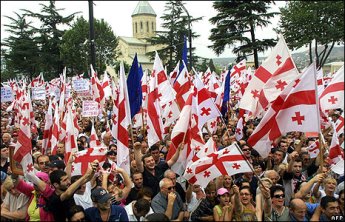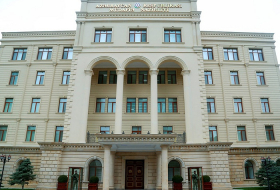Political paradoxes of Tbilisi
Hopes are fading regarding the clarity to be brought by the “Georgian dream” into some dark aspects of the political life in the country. New contradictions come to surface. Inconsistency between the posture of the new authorities and the political course pursued by their predecessors for the past several is at times grotesque. Outcome of the elections attest not to the political alternatives, as described by Tbilisi and its Western friends, but rather to the existence of political paradoxes. There are two aspects to those paradoxes. The first one is the political struggle waged inconsistently with democratic principles. The second is the West`s silent observation of the processes in Georgia and reluctance to express any reaction.
First aspect emanates from the momentum in the domestic political environment. Lack of unequivocal position on the part of the West towards the developments in this small nation in the South Caucasus is the manifestation of double standards. Paradoxical processes on the Georgian political scene provide arguments solidifying the plausibility of those two assertions.
President Mikheil Saakashvili has undertaken serious endeavors in Georgia as of 2003. High-profile arrests came one after another. Those under arrest ranged from individuals involved in corruption and also in espionage in favor of foreign intelligence services, and politicians and dangerous criminals. Shortly after, the dons of the criminal underworld fled the country and the crime rate had significantly dropped. The West refrained from issuing harsh statements with regards to those processes. Despite the reports by certain NGO`s regarding the existence of the political prisoners in Georgia, that information fell on deaf ears of international organizations dealing with human rights.
Thus, several questions that deserve contemplations arise here. Why did the West fail to address the issue of the political prisoners in Georgia? If indeed there were no such prisoners, why they failed to issue respective statements in this connection? Otherwise, if the people were arrested for their political views, why there were no warnings made to the official Tbilisi? Nowadays, new contradictions emerge. B.Ivanishvili has managed to gain parliamentary backing to the document pardoning 3000 prisoners! This happened despite the veto applied by the President Saakashvili, and the Georgian Parliament Speaker D.Usupashvili signed the “Amnesty bill”, producing a document that symbolizes an apparent political-legal crisis in Georgia.
Amazingly, this perplex situation has drawn no reaction from the West. It appears that actions of President Saakashvili throughout the years were compatible with the norms of international law and protection of human rights, and present actions of B.Ivanishvili to obliterate them are equally legal. Does not it resemble the old anecdote about the priest that insisted every complainant was right? Otherwise why are those, who search for ethnic problems in every corner of Azerbaijan and stir the spurious issue of the political prisoners in the country, remain silent?
Loyalty of the West
There is a need to compare another issue. 190 persons were released whom Ivanishvili`s team considered political prisoners. This group included child murderers, and those involved in various provocations and other crimes. Saakashvili accused them of instigating national-ethnic hatred by murdering innocent people in various parts of Georgia. Those very people robbed, maimed and murdered ordinary citizens. Such incidents were frequently encountered in Azerbaijani populated regions of Georgia, where scores of innocent people died. Now the new government pardons the criminals but Western political circles and international organizations once again are blind and deaf.
Released criminals will not stop short of aggravating the criminogenic situation in the country and attempt to undertake actions against Saakashvili`s supporters. Such indications have long been apparent. Although the process was subsiding, most recently released prisoners have vocally expressed their intentions to confront Saakashvili`s proponents. There is no need to further scrutinize this distinctively clear message.
It not incidental, that members of the new government constantly raise the issue of the President`s resignation. Recent overcoming of the presidential veto must be regarded as a serious political-legal event. Thus, the release of 190 persons branded as political prisoners may exacerbate the social-political situation, and worsening of the criminogenic environment may lead to volatility. M.Saakashvili already described the actions of the new government as the “dismantlement of democracy”. Why does the West neglect the threat?
Interestingly, the U.S., EU and NATO have called upon President Saakashvili to refrain from interference, recommending the judiciary to handle the processes. Surely, it sounds as a normal recommendation. However, it appears like a frivolous game, as the decisions of Georgian courts on the same issue are strikingly different from one another.
Remorseless criminal “made” a decent man
During his Presidency Mr. Saakashvili had several members of his team arrested. Irakli Okurashvili was among them. He had held high-profile positions in 2003-2006. He served as a prosecutor general, minister of interior, president`s regional representative and even special presidential envoy for promotion and sales of Georgian wines in Russia and CIS countries. Nevertheless, in 2008 he was found guilty of three various charges and sentenced to 11 years in prison by the court in Tbilisi. A year prior to sentencing Okurashvili fled to France and obtained political asylum, but story does not end there.
Okurashvili returns to Georgia in November 2012 and his case is reviewed. This time around the court declares that this gentleman is innocent. 8 of 10 witnesses admit that their testimonies were forcibly obtained in 2008. Legally, decisions of both courts cannot be equally binding. Apparently courts` decisions are not quite genuine. Developments unfold before the eyes of the West and no reaction is given. On the contrary the politicians are warned against intervening into judiciary.
There is another notable example. Zurab Adeishvili is Georgia`s former minister of justice. He secretly fled the country two days into the victory of B.Ivanishvili in the parliamentary elections in Georgia. He was accused of “disgraceful and inhuman behavior”, implying his actions with regards to inmates in Georgian prisons.
Georgian government accused Z.Adeishvili of appalling violations of human rights. Notwithstanding, this former official is freely traversing Europe and is yet to be apprehended, regardless of being wanted by the Interpol. In other words, the Western countries are harboring a person wanted for violations of human rights. What is the motive? What if Z.Adeishvili is the West`s “homeboy”? Something like “our criminal is a good criminal”! Why are not the Western democrats bothered by the fact that in 5 years time this criminal “became” an innocent man? No one is questioning Adeishvili for his actions that humiliated people.
Those very circles should question the Georgian authorities about a Svan (sub-ethnic group of Georgians) man that beheaded Azerbaijani elderly person or inquire the death of another Azerbaijani man that refused to pay a bribe in the Marneuli market, and ultimate impunity with regards to the perpetrators of those heinous crimes.
Broader scale double standards are now apparent. Bizarre political and legal developments in Georgia fail to be acknowledged by the West. Application of double standards by the West with regards to the countries of the South Caucasus is likely to produce negative geopolitical results. Policy has to be just under any circumstances. Deviation from those principles entails imminent problems. Geopolitical issues are not confined to the region in the modern times. It is on the global scale that complex situation surfaces. The West drags the world towards uncertainty as it persistently applies double standards in this region.
Newtimes.az
More about:
















































